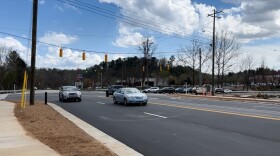Duke University student Sofia Dib-Gomez was excited to vote in the election back in November.
She registered in Durham last August, soon after arriving on campus as a first-year student. As a fellow with the Duke Votes mobilization effort, Dib-Gomez said she had become quite familiar with the voter registration process.
As a "city girl" originally from New York City, Dib-Gomez said she didn't have a driver's license, so she provided the last four digits of her Social Security number when she registered. She later confirmed her registration went through on the elections board website.
And when she checked in to vote this past fall, after standing on a long line on a hot Tuesday at an early voting site on Duke's campus, Dib-Gomez said there were no issues. Since she didn't have a driver's license, Dib-Gomez presented her U.S. Passport, another acceptable form of photo identification.
"They saw my ID, they saw my registration, they gave me my ballot," Dib-Gomez recalled. "I was very excited to vote for the first time."
After the election, Dib-Gomez said she was shocked when her name popped up on the list of voters being challenged by Supreme Court candidate Jefferson Griffin.
"I was incredibly frustrated because of how much work I'd been doing," Dib-Gomez said, "and how much I cared about this election as well as the electoral process, in general."
Turns out that Griffin's effort to toss out more than 60,000 ballots in his race for the North Carolina Supreme Court has disproportionately targeted younger voters.
Voters aged 18 to 25 make up more than 24% of the voters whose ballots Griffin challenged on the basis of incomplete voter registrations. Yet that age group accounted for under 13% of the total number of North Carolina voters who cast ballots in the 2024 general election.
Griffin, a Republican judge on the North Carolina Court of Appeals, trails by 734 votes in his race to unseat the Democratic incumbent, Justice Allison Riggs. That gap has been confirmed by two recounts.
But Griffin has staved off certification by suing to toss out ballots he claims were cast by voters who are not properly registered.
Unsurprisingly, the 18-to-25-year-old voter group includes many college students who, by circumstance, are transitory and often encounter issues with registration.
"They were registering up to the last minute, you know, in the fall when they were on campus," said Gunther Peck, a Duke University professor who teaches history and public policy. "And, so, the wave of voter registrations that needed to be processed were all right at election time."
Peck is a founder and co-director of the Student Voting Rights Lab, a collaborative project between Duke and North Carolina Central University, formed last summer to address the hurdles college voters often face in terms of registering and acquiring the requisite ID for casting a ballot.
At Duke, 730 students — about a quarter of the university's undergraduate students that voted, according to Peck — are facing ballot challenges lodged by Griffin. That number includes students whose registrations are under protest, as well as overseas citizens covered by the , or UOCAVA.
Griffin also is challenging 5,509 UOCAVA ballots drawn from four of the state's bluest counties because the voters did not provide photo ID, even though exempts them from doing so.
Among students at NCCU, one of the state's historically Black institutions, Peck said Griffin has challenged about 400 ballots.
Peck lamented what he called the "dispiriting" impact Griffin's protests could have on young voters seeking to engage civically, perhaps for the first time.
"These are the voters with the most at stake," said Peck. "We're teaching young people about our democracy and for so many thousands of young people their ballots are being potentially discarded even though they did everything right."
Dib-Gomez, the first-year student at Duke, didn't take the challenge to her vote lying down.
She immediately contacted the Durham County Board of Elections to check the status of her registration. The county board sent her an email confirming her registration was in order, that she presented the required identifying information, and that "[i]f the provided number did not validate in our system, you satisfied the ID requirement when you presented to vote for the first time by providing an election official with either a current and valid photo identification or a utility bill, bank statement, government check, paycheck, or other government document."
Despite this ordeal and the uncertainty looming over her ballot, Dib-Gomez said Griffin's election protest hasn't dampened her ardor for the democratic process, though she can understand how it might for other young voters.
"This is a threat to the future of, not only voters' rights in North Carolina, but in our country," Dib-Gomez warned. "The idea that, even though there's evidence that voters are completing this process accurately, that they could still be challenged with the intention of overturning an election, is a clear threat to democracy."
Griffin's attorneys have not responded to ¼ª²ÊÍøÍøÕ¾'s questions about the risks of disenfranchisement his challenges pose.
"I think that's one of the greatest harms of this challenge," said Sofia Dib-Gomez. "That voters feel like their vote doesn't matter."
"That blows," she added.







